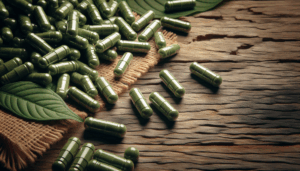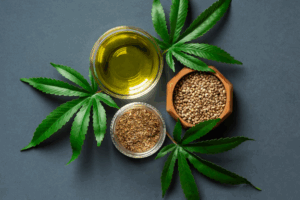Trainwreck Kratom: What It Is & Why People Love It
If you’ve explored the world of kratom, you’ve probably come across Trainwreck Kratom — a name that’s bold, a little mysterious, and often mentioned by

Is Kratom legal in Arkansas? Let’s explore the Legal Landscape of Kratom in The Natural State!
In the rolling hills of Arkansas, amidst discussions of legislative halls and public forums, Kratom—a Southeast native plant with a storied past—occupies a unique position.
Its journey through the legal maze of the natural state has been as intriguing as the lush landscapes that define it. From legislative battles to grassroots advocacy, the status of Kratom in Arkansas is a tale of contention and cautious acceptance.
So, is Kratom legal in Arkansas? Learn more about the current regulations surrounding Kratom, explore its legality, and what the future might hold for this controversial botanical substance.
Known for its natural beauty, Arkansas boasts attractions like Diamond Crater Park. It is one of the few places where visitors can keep their diamond discoveries. Despite this focus on nature, Arkansas has a strict stance on Kratom, a natural product derived from the Mitragyna Speciosa plant.
If you are questioning – if Kratom is legal in Arkansas we frequently address state-specific Kratom laws and regulations. This post is part of a series designed to answer your questions.
Kratom laws are complex. While the FDA oversees Kratom regulation, in 2016 it recommended that the DEA classify Kratom as a Schedule I substance. Although the DEA initially intended to ban Kratom, they withdrew this notice, leaving its legality to individual states.
As of 2024, Kratom is illegal in Arkansas. The state banned its sale, purchase, and possession in October 2015, joining Alabama, Indiana, Rhode Island, Wisconsin, and Vermont in implementing statewide bans. We believe this ban may be misguided and will explore Arkansas’ 2016 Kratom ban in more detail.
As of 2024, Kratom remains illegal in Arkansas. The state has upheld its ban on both the possession and sale of Kratom products, classifying the active compounds in Kratom, mitragynine, and 7-hydroxymitragynine, as Schedule I controlled substances.
This classification places Kratom in the same category as drugs deemed to have a high potential for abuse and no accepted medical use.
Arkansas residents could sell and use Kratom until October 2015, when it was banned due to what some claim was misleading information. At the urging of the Arkansas Director of the Department of Health, Kratom was classified as a Schedule I controlled substance, partly influenced by Dr. Thomas Atkinson, who noted patients using it as a street drug alternative.
The state upheld the ban, seemingly influenced by the DEA and certain medical professionals’ concerns about Kratom’s risks. As of now, there are no efforts to overturn the legislation.
Arkansas banned Kratom in 2015, prohibiting its sale and possession statewide. Violators face severe penalties:
with up to 20 years in jail or $15,000 in fines, for over 28 grams. Possession near schools, parks, or other sensitive areas can add 10 years to the sentence. These strict laws are likely due to concerns over Kratom’s safety and potential for abuse, despite its natural origin and traditional uses.
Arkansas classified Kratom as a Schedule I Substance on February 1, 2016. This decision, which many consider erroneous, was made under the authority of the Arkansas Director of the Department of Health.
The state’s controlled substances act was amended to include Kratom, specifically its alkaloids mitragynine and 7-hydroxymitragynine. The reclassification was largely influenced by a single physician from a treatment facility in Springdale, Arkansas.
Kratom is currently prohibited throughout Arkansas, but this ban could be overturned. In the United States, laws can change due to public scrutiny. Supporting the Federal Kratom Consumer Protection Act (KCPA) is crucial for this cause.
The American Kratom Association (AKA) advocates for the KCPA, which ensures industry regulation and protects vendors from undue prosecution. Six states, including Arizona, Georgia, Nevada, Oklahoma, Oregon, and Utah, have passed versions of the KCPAs, setting a precedent for others.
Arkansas can help by supporting these efforts in other states, paving the way for potential legalization there.
Regulating Kratom is crucial for ensuring the safety and quality of this product, protecting both vendors and consumers. Key regulatory measures typically include:
1. Testing for alkaloid concentrations to guarantee product consistency.
2. Screening for harmful additives or contaminants.
3. Setting procedures for processing and storage to prevent mold and degradation.
4. Imposing age restrictions for purchasing Kratom.
5. Mandating packaging and display standards, including clear ingredient lists and serving size recommendations.
These policies help prevent the sale of adulterated Kratom and promote informed usage, ultimately making Kratom safer for everyone.
In banned states like Arkansas, some Kratom vendors still ship the product, but possessing, buying, or selling Kratom within the state is a serious offense.
It’s classified as a felony, carrying penalties such as up to 20 years in prison and fines of up to $15,000 for possession of more than two grams. Possessing over 28 grams could lead to a class B felony charge, punishable by five to 20 years imprisonment and fines up to $15,000.
Public possession near designated locations can incur an additional 10-year sentence for endangering public welfare. The strict penalties underscore the state’s firm stance against Kratom use and distribution.
In conclusion, “Is Kratom legal in Arkansas?” Kratom remains illegal in Arkansas as of 2024, with strict regulations prohibiting its possession, sale, and distribution.
Despite growing advocacy for regulated use, the state continues to classify Kratom as a Schedule I controlled substance due to concerns over safety and potential abuse. Understanding the current laws and the history behind Kratom’s legal status in Arkansas is essential for residents and visitors alike.
While the future of Kratom’s legality in the state is uncertain, ongoing discussions and advocacy efforts may eventually influence a shift toward regulated use. For now, however, the purchase and use of Kratom in Arkansas carry significant legal risks.
You can purchase the best Kratom products online. Discover the ultimate blend of quality and innovation with Club13 Herbals. Our exceptional range of Kratom products includes seltzers, Kratom powder and capsules, blends, and many more, designed to elevate your well-being.
Kratom is illegal in several states in the USA, including Alabama, Arkansas, Florida, Indiana, Tennessee, and Wisconsin. It is also banned in some cities and counties across the country.
No, Kratom is illegal in Arkansas in 2016. The state legislature passed a law that year banning the sale, possession, and use of Kratom within its borders.
No, it is illegal to purchase kratom online if you live in Arkansas. Shipping kratom to Arkansas is also prohibited under state law.
References:
1) Federal Kratom Consumer Protection Act: Text: S.3039 — 118th Congress (2023-2024)2) 2020 Arkansas Code: § 5-64-419. Possession of a controlled substance: Universal Citation: AR Code § 5-64-419 (2020)
If you’ve explored the world of kratom, you’ve probably come across Trainwreck Kratom — a name that’s bold, a little mysterious, and often mentioned by

What Is Kratom Seltzer? Everything You Need to Know Move over, hard seltzers — a new kind of botanical brew is making waves. Kratom seltzer

Top 7 Kratom Capsules That Work (And Where to Get Them) With the growing number of kratom brands entering the market, finding quality capsules you
Why Red Maeng Da Kratom Is the #1 Choice for Daily Buyers In the world of kratom, Red Maeng Da is one of the most

Plants like Kratom and CBD have received significant attention in recent years for their potential to improve overall wellness. As these two substances continue to